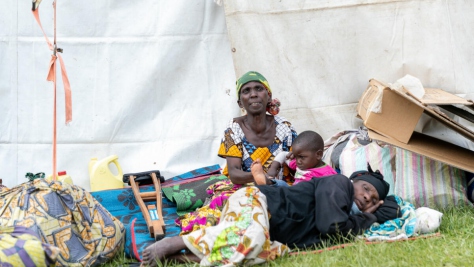UNHCR concerned over ending of rescue operation in the Mediterranean
This is a summary of what was said by UNHCR spokesperson William Spindler – to whom quoted text may be attributed – at today's press briefing at the Palais des Nations in Geneva.
UNHCR is concerned over the announcement of the ending this month of the Italian operation Mare Nostrum without a similar European search and rescue operation to replace it. This will undoubtedly increase the risk for those trying to find safety in Europe, and could lead to more refugees and migrants perishing at sea. It is estimated that 3343 people have lost their lives this year while making such journeys, 2755 of them since the start of July.
UNHCR has welcomed Mare Nostrum, which has contributed to the rescue of around 150,000 refuges and migrants since it began a year ago as a response to two tragedies off the coast of Lampedusa, where over 600 refugees and migrants died. Today, UNHCR reiterates its call for Europe to commit more resources to rescue at sea in the Mediterranean.
It is critical that the long-established tradition of rescue at sea is upheld by all. UNHCR also recognizes the efforts made by many commercial vessels - this year alone they have contributed to the rescue of about 37,000 people. To the extent possible, such rescue must ensure minimal financial impact on the shipping industry. Predictability on places for the disembarkation in safety of those rescued is also required.
In addition, Europe needs to step up efforts to provide credible legal alternatives to dangerous voyages to protect people from the risks of traveling with smugglers. The collective response needs to maintain a strong capacity to rescue people at sea and increase safer ways for refugees to find safety in Europe, including enhanced resettlement, other forms of humanitarian admission and private sponsorship schemes. UNHCR is also calling on European governments to do more to facilitate family reunification and use programmes such as student or employment visas to benefit refugees.
The level of desperation among many of those involved, fleeing war, persecution and violence, including from Syria require our concerted efforts to respond. This trend began in June and July last year, before Mare Nostrum was established, and has continued in 2014. In addition, an increased number of women, children, including many unaccompanied, and elderly people are taking to dangerous sea routes. They face greater risks, are more vulnerable to abuse and have specific needs that require assistance after they are rescued.
These challenges cannot be addressed by a few states alone; a joint European response is needed, based on collaboration among states and EU support. These efforts also need to ensure additional initial reception facilities, adequate reception conditions, assistance in processing as well as identifying solutions for those in need of international protection
For more information on this topic, please contact:
- In Rome, In Rome, Carlotta Sami on mobile +39 335 679 4746
- In Rome, Federico Fossi on mobile +31 349 0843461
- In Geneva, William Spindler on mobile +41 79 217 3011
Related news and stories
First UNITY Cup shows the power of football to connect refugees and hosts
Scholarships in Italy allow refugees to dream again
Relief for asylum seekers offered a new life outside Libya
Evacuation flights from Libya to Italy bring hope for vulnerable asylum seekers
UNHCR and Council of Europe discuss statelessness, urge States to uphold the right to a nationality in Europe
UNHCR warns of mounting refugee and migrant deaths in the Central Mediterranean
-

Some 350,000 people in urgent need of help in Goma
1 Jun 2021 -

UNHCR urges stronger support for refugee vaccinations in Asia
1 Jun 2021 -

Projected Global Resettlement Needs 2022 (PDF)
Jun 2021 The Projected Global Resettlement Needs report contains details of the protection environment and refugee profiles in need of resettlement in UNHCR operations globally. It serves as the primary reference document for dialogue on resettlement needs, priorities, likely gaps and challenges in programme delivery, allowing informed decisions on quota and resource allocations. -

UNHCR-ESSA, Complementary Pathways through Education for Refugees in the West and Central Africa Region: Mapping Refugee Education Opportunities, June 2021
Jun 2021 -

UNHCR Country Strategy Evaluation: Egypt
Jun 2021 This is a formative Country Strategy Evaluation (CSE) with the purpose of generating evidence, insights and learning to inform the United Nations High Commissioner for Refugees' (UNHCR's) future operational planning and strategy in Egypt. Attachments: Management response and Annexes (.zip) -

Apprentices become partners as Afghan refugee and Iranian team up
31 May 2021 After vocational training with UNHCR, auto apprentice Abbas met intern Danial and the two launched their own repair shop employing refugees and locals in Iran's Shiraz. -

Renewed commitment needed to support displaced Afghans and their hosts
31 May 2021 -

Donated airmiles help Eritrean father reunite with his daughters
31 May 2021 A new partnership between the charity Miles4Migrants and UNHCR aims to help more refugees to reunite with their families. -

Stronger international support urgently needed to improve access to higher education for young refugees
28 May 2021
